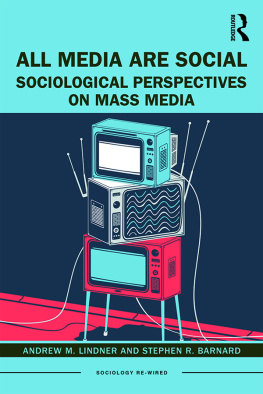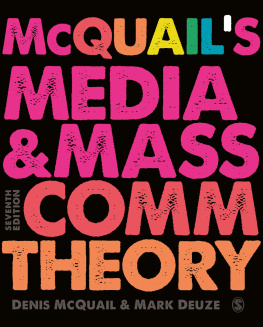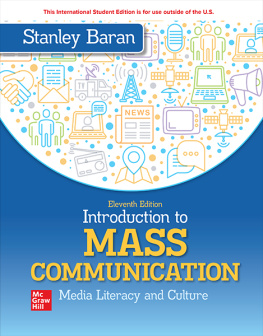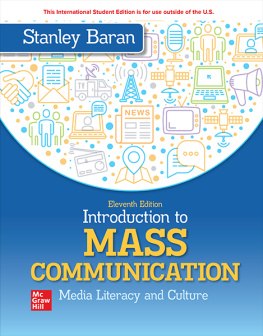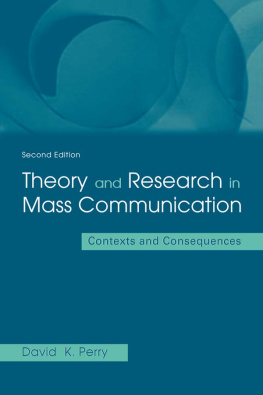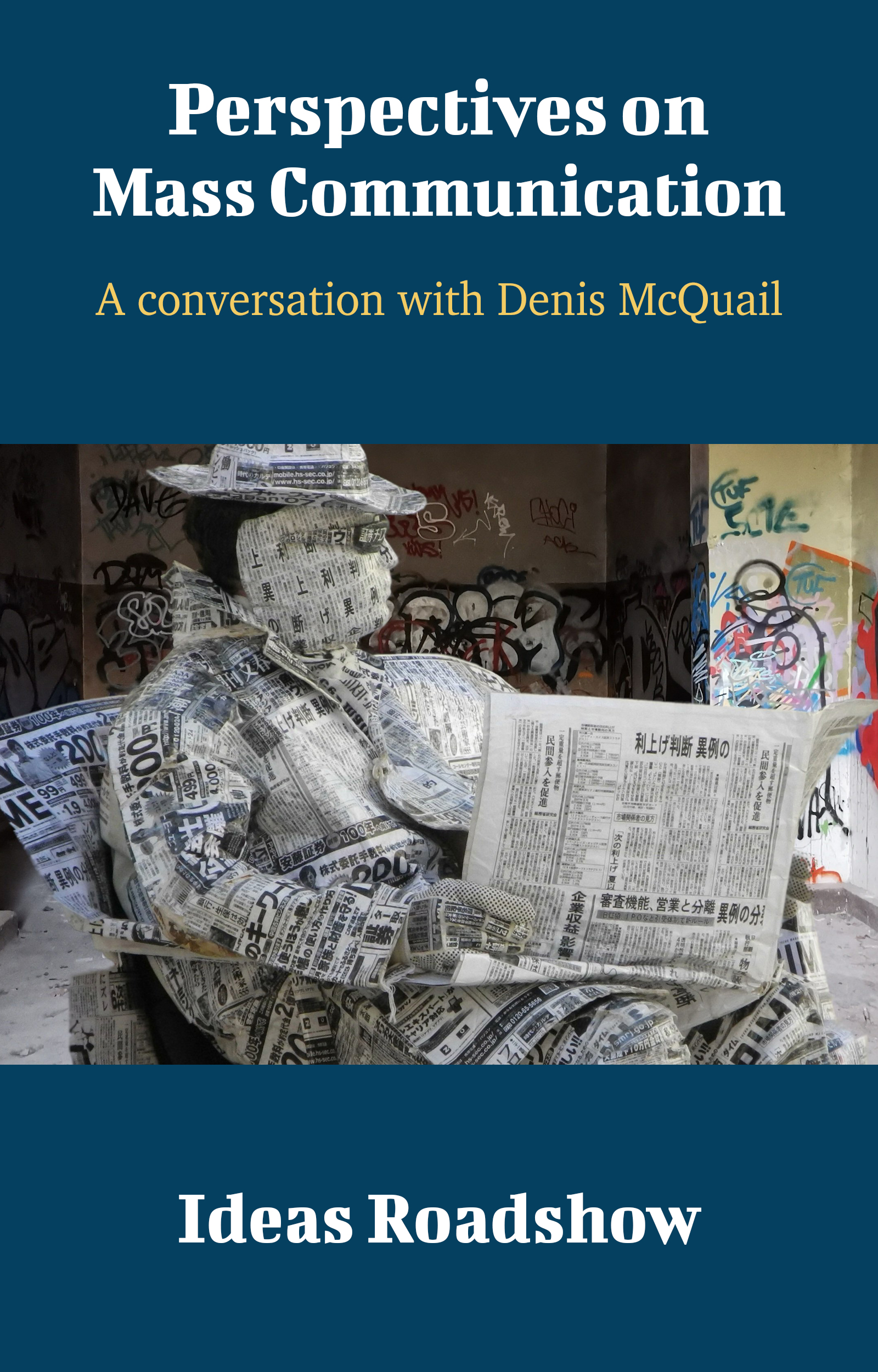The contents of this book are based upon a filmed conversation between Howard Burton and Denis McQuail in Southampton, England on April 28, 2014.
Introduction
A Sense of Perspective
Quis custodiet ipsos custodes?
This famous phrase, attributed to the Roman poet Juvenal from his Satires, is literally translated as Who guards the guards themselves? but is generally regarded as tantamount to simply asking, Whos watching the watchers?
In our modern age, where everyone seems to have a camera pointed at everything at all times, the watchers takes on a radically new meaningas does, necessarily, the potential watcher of the watchers.
The media often appears as some sort of distinct presence removed from the rest of societyan unholy behemoth of corporate interests for some, an apologist for bleeding heart socialists for others. But whatever side of the political spectrum you might find yourself on, and however much you might naturally agree, or disagree, with Fox News or The New York Times or Rupert Murdoch, you would be dead wrong to conclude that media, or communication in general, is some abstract entity that is somehow independent from the rest of society.
Closely examining the mediain particular mass medianecessarily involves a careful, probing look at what our society values. The mass media, then, in a certain sense, is a direct reflection on us.
So maintains Denis McQuail, one of the few people alive who has made a serious and systematic study of not only mass media but communication theory in general.
His series of pioneering monographs: Communication Models (with Sven Windahl) and Mass Communication Theory and Media Performance went an enormous distance towards establishing the entire discipline of communication studies, thereby shedding light on the enormous sociological influence of the media, while simultaneously delineating a clear and rigorous means by which this influence might be measured.
I think that a major flaw in quite a lot of past approaches towards studying media and communication effects was that it was detached from a prior study of society, it was detached from fundamental knowledge of processes of human communicationconsidering the human context and considering the very great diversity of communication in all aspects of human lives. This was missed, basically.
We have to look at how communication is taking place without reference to the technologiesand that applies to the new media and the so-called social media as much as anywhere else.
But what of journalism? What is the link between journalism and our societal values?
Once again, Denis is the perfect person to ask.
Back in the 1970s he was seconded to serve on the UKs Royal Commission on the Press, an event that stimulated him to develop many of the concepts, metrics and ideas that he was to harness so convincingly in his later work on mass media:
We were to make a study of so-called standards of press performance, which involved developing concepts that included diversity and objectivity and sensationalism and things of that kind that could be applied to make judgements about British newspapers. The purpose of the thing was to respond to many criticisms of the British press, in particular.
Some 40 years later, he is still ruminating deeply on the role of journalism and society, still motivated to ensure that these vital issues remain firmly in the public consciousness.
To that end, he recently published a thoughtful and penetrating analysis for journalism undergraduate students entitled Journalism and Society.
I thought that journalism students at the first or second year level might benefit from a wider perspective than just the craft or task of journalismthe practical things that they have to learn anyway. Its important to be aware of the wider perspective of their role in society.
But, as Denis takes great pains to mention, this notion of the wider perspective of journalists role in society, and our consequent ability to measure and assess it, naturally goes well beyond the interests of just journalism students. It is something that we all have a stake in.
This latest book was fed by preoccupations that Ive had for a long time, in particular the development of valuative concepts that could be empirically applied and tested.
So one could make statements about the media or media systems, of particular press organs or broadcasting associations or whatever media services one chooses in a wide range of terms: information quality, communicative possibility, diversity, balance and bias, as well as the independence and freedom that is available to journalistsin theory anywayand how this is being used, whether or not it has any impact on performance.
And what of freedom of the press?
Some of the norms of journalistic freedom have been strengthened, but on the other hand, what the empirical researchnot so much mine, but from what I can gather of other comparative studies of journalistshas demonstrated strong evidence of a public grassroots resistance to too much freedom, as it were.
Its based on a notion of patriotism or nationalism sometimes, a wish for order, and a critique of the excesses of the press. In short, instead ofas one might supposeprincipally the powers that be who want to limit the activities of the press, thats not so much the case. There is a strong constituency that sees a completely unhindered press as somehow a societal threat.
How can that be? Primarily because the vast majority of people in most places dont fully appreciate what the role of the press could and should be.
There isnt a widespread understanding of that critical role of journalism or the significance of it. Even journalists themselves are not fully agreed on this. They divide significantly here according to the priority they attach to critical perspectives on whatever it may bevarious sources of economic and political power.
And it isnt just journalists, but also the positioning of the mainstream press as an institution in society with a certain sense of obligation, with all kinds of links to clients and contacts
And once again the key point:
Its part of the society. The press is not a separate body. It can be identified. It has particular tasks, but its also very much integrated. And its also the case that the established press doesnt necessarily see all that much economic self-interest in the activity that some kinds of criticism are.







